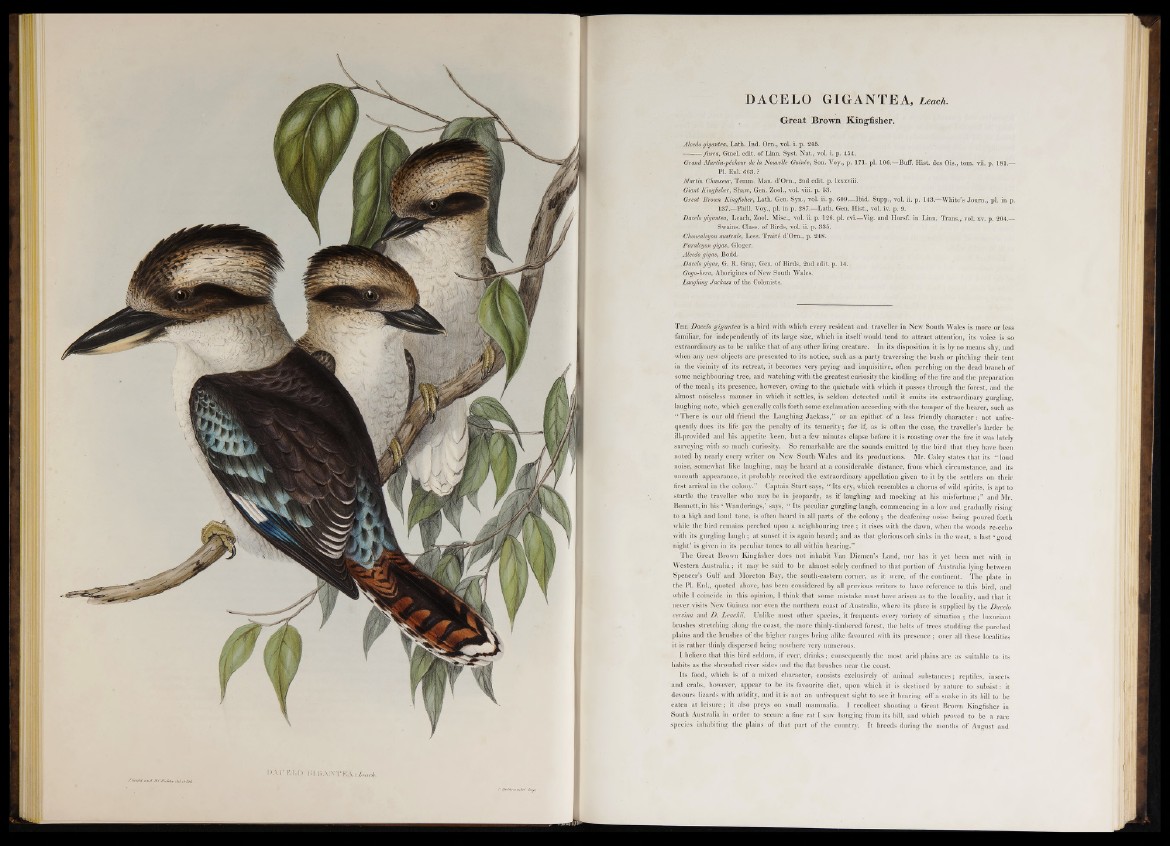
DACELO GIGANTEA, Leach.
Great Brown Kingfisher.
Alcedo gigantea, Lath. Ind. Qrn., vol. i. p. 245.
fused, Gmel. edit, of Linn. Syst. Nat., vol. i. p. 454.
Grand Martin-pêcheur de la Nouvelle Guinée, Son. Voy., p. 171. pl. 106.—Buff. Hist, des Ois., tom. vii. p. 181.—
Pl. Enl. 6 6 8 . ^ p
Martin Chasseur, Temm. Man. d’Om., 2nd edit. p. lxxxviii.
Giant Kingfisher, Shaw, Gen. Zool., vol. viii. p. 53.
Great Brown Kingfisher, Lath. Gen. Syn., vol. ii. p. 609.—Ibid. Supp., vol. ii. p. 143.—White’s Joum., pi. in p.
137.—Phill. Voy., pi. in p. 287.—Lath. Gen. Hist., vol. iv. p. 9.
Dacelo gigantea, Leach, Zool. Misc., vol. ii. p. 126. pi. cvi.—Vig. and Horsf. in Linn. Trans., vol. xv. p. 204.—
Swains. Class, of Birds, vol. ii. p. 335.
Choucalcyon australe, Less. Traité d’Orn., p. 248.
Paralcgon gig as, Gloger.
Alcedo gigas, Bodd.
.Dacelo gigas, G. R. Gray, Gen. of Birds, 2nd edit. p. 14.
Qogo-bera, Aborigines of New South Wales.
Laughing Jackass of the Colonists.
T h e Dacelo gigantea is a bird with which every resident and traveller in New South Wales is more or less
familiar, for independently o f its large size, which in itself would tend to attract attention, its voice is so
extraordinary as to be unlike that o f any other living creature. In its disposition it is by no means shy, and
when any new objects are presented to its notice, such as a party traversing the bush or pitching their-tent
in the vicinity of its retreat, it becomes very prying -and inquisitive, often perching on the dead branch of
some neighbouring tree, and watching with the greatest curiosity the kindling o f the fire and the preparation
of the meal; its presence, however, owing to the quietude with which it passes through the forest, and the
almost noiseless manner in which it settles, is seldom detected until it emits its extraordinary gurgling,
laughing note, which generally calls forth some exclamation according with the temper o f the hearer, such as
“ There is our old friend the Laughing Jackass,” or an epithet of a less friendly character: not unfre-
quently does its life pay the penalty of its temerity; for if, as is often the case, the traveller’s larder be
ill-provided and his appetite keen, but a few minutes, elapse before it is roasting over the fire it was lately
surveying with so much curiosity. So remarkable are the sounds emitted by the bird that they have been
noted by nearly every writer on New South Wales and its productions. Mr. Caley states that its “ loud
noise, somewhat like laughing, may be heard at a considerable distance, from which circumstance, and its
uncouth appearance, it probably received the extraordinary appellation given to it by the settlers on their
first arrival in the colony.” Captain Sturt says, “ Its cry, which resembles a chorus o f wild spirits, is apt to
startle the traveller who may be in jeopardy, as if laughing and mocking at his misfortune;” and Mr.
Bennett, in his ‘ Wanderings,’ says, “ Its peculiar gurgling laugh, commencing in a low and gradually rising
to a high and loud tone, is often heard in all.parts of the colony; the deafening noise being poured forth
while the bird remains perched upon a neighbouring tr e e ; it rises with the dawn, when the woods re-echo
with its gurgling laugh; at sunset it is again heard; and as that glorious orb sinks in the west, a last ‘ good
night’ is given in its peculiar tones to all within hearing.”
The Great Brown Kingfisher does not inhabit Van Diemen’s Land, nor has it yet been met with in
Western Australia; it may be said to be almost solely confined to that portion of Australia lying between
Spencer’s Gulf and Moreton Bay, the south-eastern corner, as it were, o f the continent. The plate in
the PI. Enl., quoted above, has been considered by all previous writers to have reference to this bird, and
while I coincide in this opinion, I think that some mistake must have arisen as to the locality, and that it
never visits New Guinea nor even the northern coast o f Australia, where its place is supplied by the Dacelo
cervina and D. Leachii. Unlike most other species, it frequents every variety of situation ; the luxuriant
brushes stretching along the coast, the more thinly-timbered forest, the belts of trees studding tbe parched
plains and the brushes o f the higher ranges being alike favoured with its presence; over all these localities
it is rather thinly dispersed being nowhere very numerous.
I believe that this bird seldom, if ever, drinks: consequently the most arid plains are as suitable to its
habits as the shi’ouded river sides and the flat brushes near the coast.
Its food, which is of a mixed character, consists exclusively o f animal substances; reptiles, insects
and crabs, however, appear to be its favourite diet, upon which it is destined by nature to subsist: it
devours lizards with avidity, and it is not an unfrequent sight to see it bearing off a snake in its bill to be
eaten at leisure; it also preys on sniall mammalia. I recollect shooting a Great Brown Kingfisher in
South Australia in order to secure a fine rat I saw hanging from its bill, and which proved to be a rare
species inhabiting the plains of that part of the country. It breeds during the months of August and